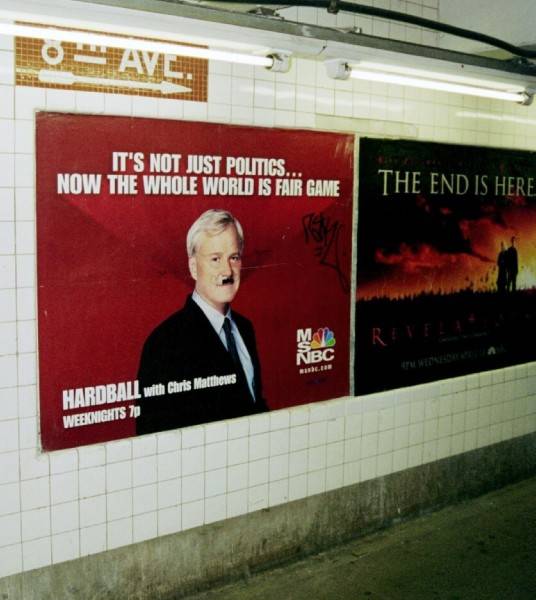What’s Real (and not) in American Politics?
For me at least, the passing of William F. Buckley adds another nail in the coffin of “real” as opposed to “reality” tele and other journalism. Bill never crossed the, at one time, clear line between the two. As conservative as Bill Buckley was, he was also respected by those on the Left and was often critical of the Right. Frankly speaking, I often can’t distinguish between The Daily Show, The Colbert Report, O’Reilly, Hannity and Colmes, Hardball, Lou Dobbs, and even Kudlow and Company. Virtually all stripes of writers and TV hosts barely hide their partisanship and boosterisms. As the graffiti subway poster shows, the public is not fooled by claims of journalistic objectivity but they also don’t seem to care.
Not surprisingly, today’s candidates for the highest public office are as likely to appear today on Oprah and Saturday Night Live as on Meet the Press and Charlie Rose. Does fact and/or fiction make a difference in life? When I was growing up on the gritty streets of Brooklyn, I was constantly bombarded by cautionary aphorisms, admonitions, and axioms such as “Trust him as far as you can throw him.”, “Don’t believe everything you hear.”, “All that glitters is not gold.”, and the multi-purpose “Things aren’t always as they appear.” It was many years before I grasped the meanings of statements which, paradoxically, refuted themselves. I was singularly gullible and often talked into engaging in dangerous, and sometimes criminal acts by so-called “friends.” So much so that a common retort by authorities (parents, teachers, priests, cops) to my many admissions of guilt was: “If he told you to jump off the Empire State Building would you do it?” To which I would reply, “It depends.” Little did I know that many others had trouble deciphering reality. Plato needed a cave and Lewis Carroll a rabbit hole to explain the worlds they lived in. And Baudrillard?; he gave up on the project and invented hyperreality.
Now many pundits talk about the US Presidential race as though it were a simulation of something else. They mistakenly think the public is confused and can’t distinguish between the actual and the virtual. The most recent of these was an excellent piece by Allessandra Stanley in The New York Times. In The TV Watch she asked the rhetorical question: “20th Debate: Reality Show or a Spinoff?” (2/27/08) Alessandra noted that at the televised Ohio debate Hillary claimed that the press was tougher on her than ‘Bama. To prove it, she unabashedly cited a Saturday Night Live sketch in which the “journalists” asked Barack if he was comfortable. “And for the rest of the evening, the MSNBC debate did look a bit like the “S.N.L.” parody.” In the same sense that The New York Times mirrors The Onion (a parody paper), I might add. There is also the case of the “Two Hil’s.” By that I mean the consecutive appearances of Paris Hilton and then Hillary Rodham Clinton on The David Letterman Show just before “Super Tuesday” (February 5th) which, if I remember correctly stopped one of “Hil’s” in her tracks. We must wait until the results from “Little Super Tuesday” (March 4th) to measure the impact of the “SNL” as opposed to the Letterman” Effects. Apropos of the blending of realities was a recent “Hot Search” offered on Google for: “democratic debate,” followed by “American idol.” Writers and commentators of merit can’t keep themselves from scribing about the time that “Hillary cried” and when “girls swooned when Obama smiled,” or wore a “Somali costume” and committed “plagiarism.” They note that John McCain may have had an “affair with a lobbyist” but ignore the fact that McCain bases much of his “right” to the presidency on his stature as both a victim of torture as well its occasional advocate. There seem to be no real, I mean burning, issues in America today. There is no “manifesto; as in “what to do.” We Americans select the candidate first and then screenwriters script a platform. It is the Great Race, American Idol, Survivor, et al combined. I’m sure that “fictional?” television programs like 24 made Obama more acceptable as President because viewers got used to seeing a Black man (Dennis Haysbert as President Palmer) in the White House. The short-lived Commander and Chief , starring Geena Davis as President Mackenzie Allen, might have done the same for the “better half.” If you were to Google the interrelation between real and imagined black and female presidents during this, an election year you would find tens of thousands of entries, not the least of which (CNN 2/23/07) notes that
BEVERLY HILLS, California (AP) -- The United States will have a female president next year—on the Fox TV series “24.” It is no wonder why we can’t distinguish reality in our virtual cave today where reality, simulation, simulacra, and hyperreality are interchangeable. American politics is not “like” a television show. It “is” a television show. “Where is Jean Baudrillard when you need him?”, he said jokingly. Ask William F. Buckley.


































i-Italy
Facebook
Google+
This work may not be reproduced, in whole or in part, without prior written permission.
Questo lavoro non può essere riprodotto, in tutto o in parte, senza permesso scritto.